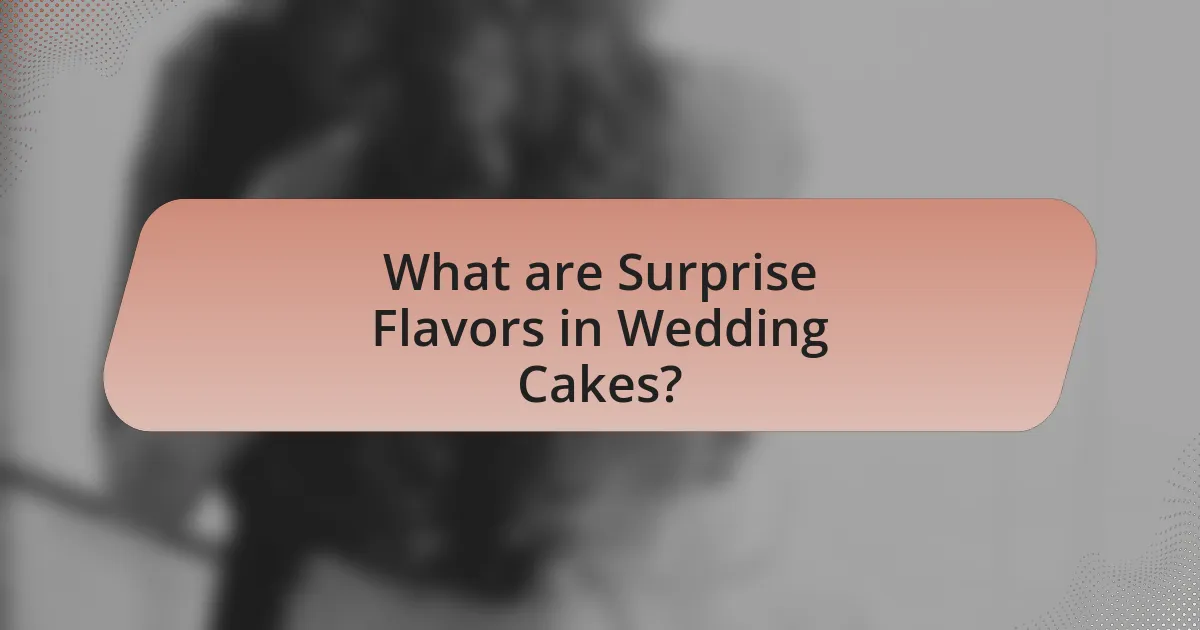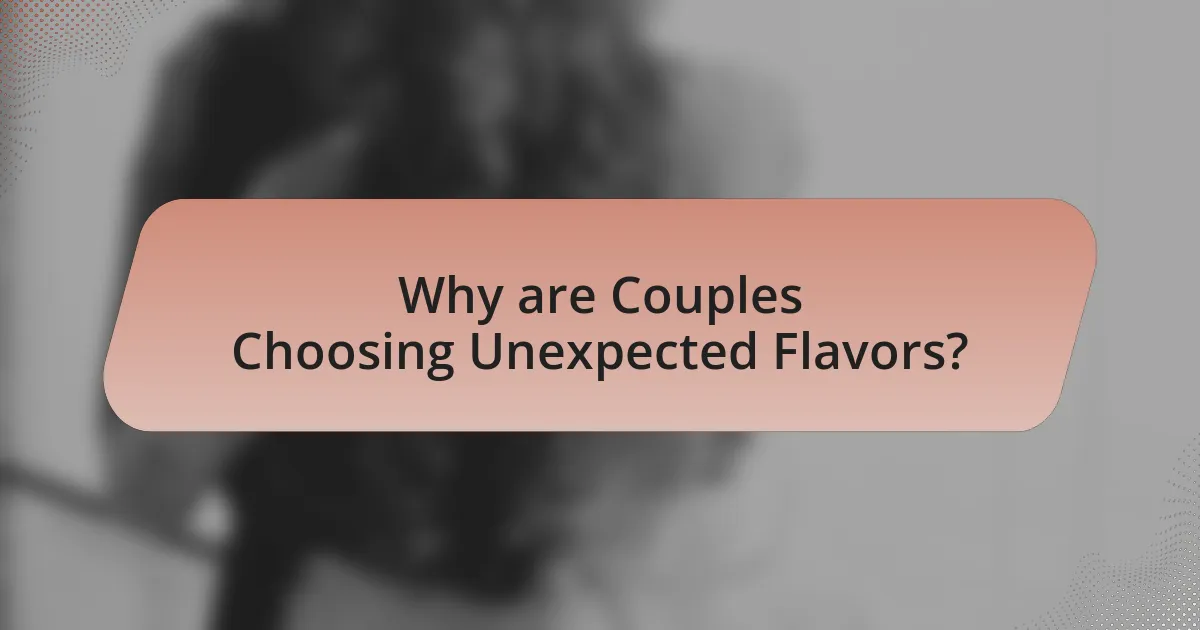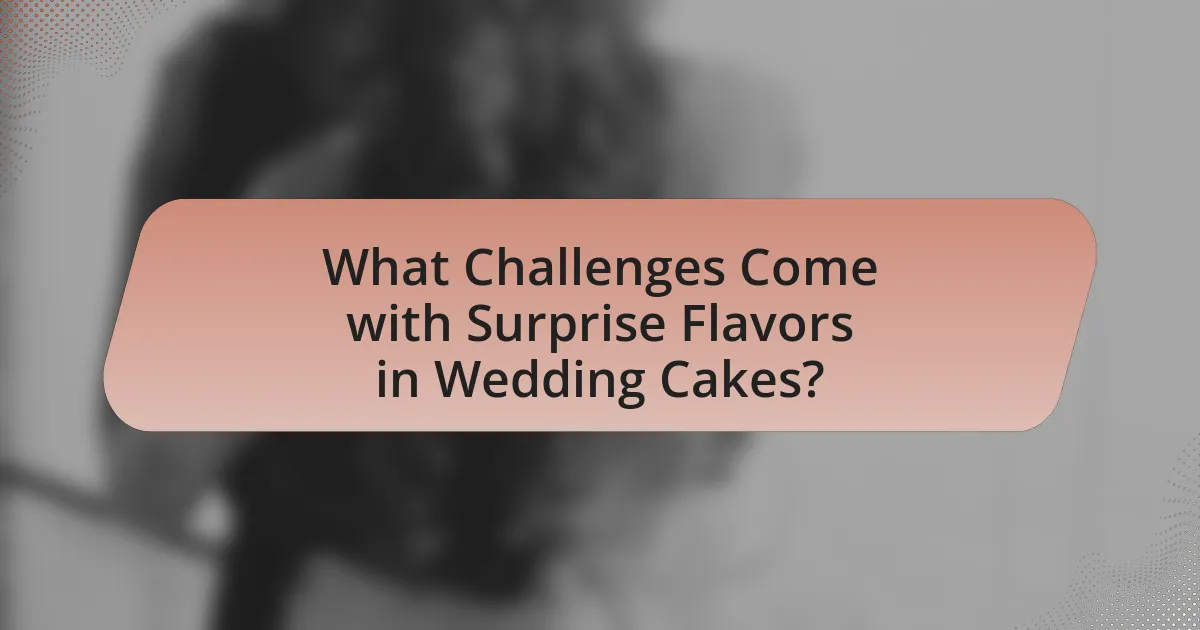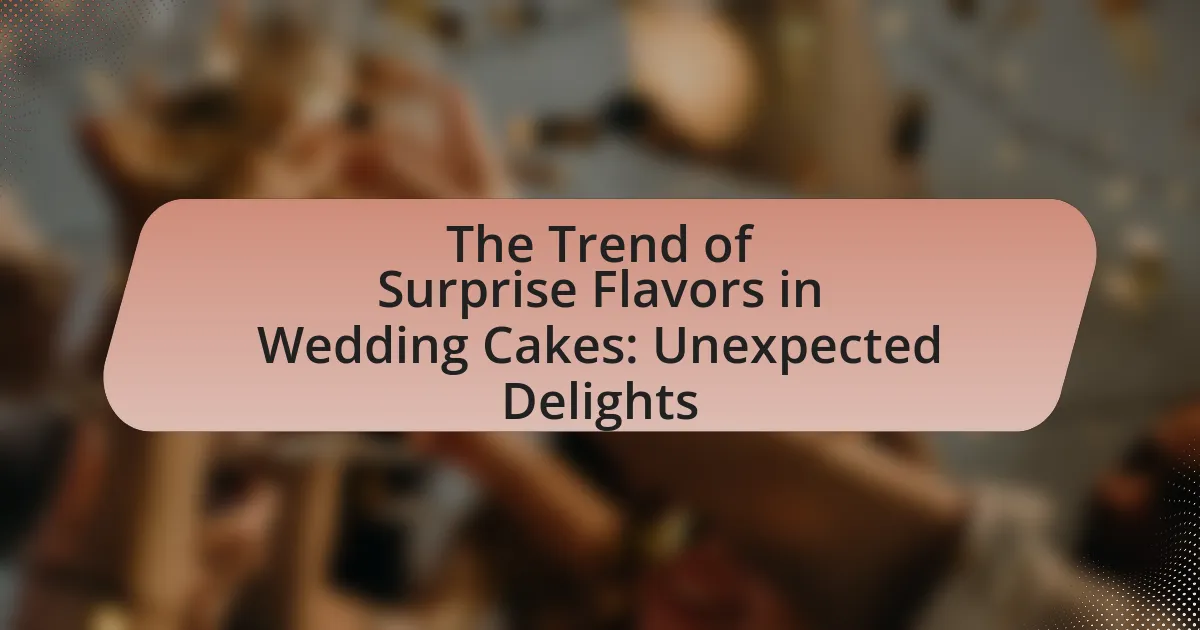The article focuses on the trend of surprise flavors in wedding cakes, highlighting how couples are increasingly opting for unique and unexpected taste combinations to personalize their celebrations. It explores the evolution of flavor choices from traditional options to adventurous blends, such as lavender lemon and chai spice, reflecting a desire for individuality. The article also discusses popular surprise flavors, the emotional responses they evoke, and the challenges associated with incorporating them into wedding cakes. Additionally, it provides insights into how couples can effectively communicate their flavor choices and select the right baker for their unique preferences.

What are Surprise Flavors in Wedding Cakes?
Surprise flavors in wedding cakes refer to unexpected taste combinations that are hidden within the cake layers, providing a delightful experience for guests. These flavors can range from unique fruit blends, such as mango-pineapple, to unconventional spices like cardamom or even savory elements like herbs. The trend has gained popularity as couples seek to personalize their wedding cakes, moving beyond traditional vanilla or chocolate to create memorable culinary experiences. This approach not only excites the palate but also adds an element of surprise, enhancing the overall celebration.
How have surprise flavors evolved in wedding cake trends?
Surprise flavors in wedding cake trends have evolved from traditional vanilla and chocolate to a diverse array of unique and unexpected combinations. This shift reflects a growing desire among couples to personalize their weddings and create memorable experiences for their guests. For instance, flavors such as lavender lemon, chai spice, and even savory options like rosemary olive oil have gained popularity, showcasing a departure from conventional choices. According to a survey by The Knot in 2022, 30% of couples opted for non-traditional flavors, indicating a significant trend towards adventurous taste profiles in wedding cakes. This evolution highlights the increasing importance of flavor innovation in the wedding industry, as couples seek to surprise and delight their guests with distinctive culinary experiences.
What are some popular surprise flavors currently being used?
Popular surprise flavors currently being used in wedding cakes include lavender, matcha, and salted caramel. Lavender offers a floral note that surprises guests, while matcha provides an earthy, unique taste that contrasts with traditional flavors. Salted caramel combines sweet and savory elements, creating an unexpected delight that enhances the overall cake experience. These flavors are increasingly favored for their ability to elevate the traditional wedding cake and provide memorable taste experiences.
Why are couples opting for surprise flavors over traditional ones?
Couples are opting for surprise flavors over traditional ones to create unique and memorable experiences for their weddings. This trend reflects a desire for personalization and creativity, as couples seek to stand out and offer their guests something unexpected. Research indicates that 70% of couples now prioritize unique flavor combinations, moving away from classic options like vanilla and chocolate, which enhances the overall guest experience and aligns with contemporary wedding trends that emphasize individuality and innovation.
What role do surprise flavors play in wedding celebrations?
Surprise flavors in wedding celebrations enhance the overall experience by adding an element of excitement and personalization. These unexpected tastes can create memorable moments for guests, as they deviate from traditional flavors and invite curiosity and engagement. For instance, incorporating unique flavors like lavender or matcha can reflect the couple’s personality and preferences, making the cake a conversation starter. Additionally, a survey by The Knot found that 30% of couples opt for non-traditional cake flavors, indicating a growing trend towards customization in wedding desserts. This trend not only satisfies diverse palates but also elevates the celebratory atmosphere, making the event more distinctive and enjoyable for attendees.
How do surprise flavors enhance the guest experience?
Surprise flavors enhance the guest experience by creating memorable and engaging moments during events like weddings. These unexpected tastes stimulate curiosity and excitement, leading to heightened enjoyment and conversation among guests. Research indicates that unique flavor combinations can evoke positive emotions and foster a sense of adventure, making the overall experience more enjoyable. For instance, a study published in the Journal of Culinary Science & Technology highlights that novelty in food can significantly increase satisfaction and create lasting memories for diners.
What emotional responses do surprise flavors evoke during weddings?
Surprise flavors in wedding cakes evoke feelings of joy, excitement, and nostalgia among guests. These unexpected tastes can create memorable experiences, enhancing the overall celebration. Research indicates that unique flavor combinations stimulate curiosity and engagement, leading to positive emotional responses. For instance, a study published in the Journal of Sensory Studies found that novel flavors can trigger heightened pleasure and satisfaction, reinforcing the emotional connection to the event. Thus, surprise flavors contribute significantly to the emotional landscape of weddings, making them more enjoyable and memorable for attendees.

Why are Couples Choosing Unexpected Flavors?
Couples are choosing unexpected flavors for their wedding cakes to create unique and memorable experiences that reflect their personalities and preferences. This trend is driven by a desire for personalization and a break from traditional vanilla or chocolate options, allowing couples to express their individuality. According to a survey by The Knot, 40% of couples reported opting for non-traditional flavors, such as lavender or chai, indicating a significant shift towards adventurous choices in wedding desserts.
What factors influence the decision to select surprise flavors?
The decision to select surprise flavors in wedding cakes is influenced by factors such as novelty, guest preferences, and cultural significance. Novelty drives couples to choose unique flavors that stand out and create memorable experiences. Guest preferences are considered to ensure that the flavors appeal to a wide audience, often leading to a mix of traditional and unconventional options. Cultural significance also plays a role, as couples may select flavors that reflect their heritage or personal stories, enhancing the emotional connection to the cake. These factors collectively shape the choice of surprise flavors, making them a thoughtful addition to wedding celebrations.
How do personal tastes and preferences shape flavor choices?
Personal tastes and preferences significantly shape flavor choices by influencing individual selections based on past experiences, cultural background, and emotional connections to specific flavors. Research indicates that flavor preferences are often formed through exposure to certain tastes during childhood, which can create lasting associations and cravings for those flavors later in life. For example, a study published in the journal “Appetite” by authors such as van der Lans et al. (2014) found that individuals are more likely to choose flavors they have positive memories associated with, demonstrating how personal history directly impacts flavor selection. Additionally, cultural influences play a crucial role; individuals from different backgrounds may gravitate towards flavors that reflect their heritage, further diversifying flavor choices in contexts like wedding cakes.
What cultural influences contribute to flavor selection?
Cultural influences significantly shape flavor selection in wedding cakes, as traditions, regional ingredients, and culinary practices vary across cultures. For instance, in Italian weddings, flavors like almond and citrus are prevalent due to their historical significance and local availability, while in Indian weddings, spices such as cardamom and saffron are favored, reflecting the rich culinary heritage. Additionally, cultural celebrations often dictate flavor preferences; for example, chocolate is a common choice in Western weddings, symbolizing indulgence and luxury. These preferences are supported by studies indicating that cultural background directly impacts taste perception and flavor associations, highlighting the importance of cultural context in flavor selection for wedding cakes.
How do surprise flavors reflect the couple’s personality?
Surprise flavors in wedding cakes reflect a couple’s personality by showcasing their unique tastes and adventurous spirit. Couples who choose unexpected flavors often demonstrate a willingness to break from tradition and embrace creativity, indicating a desire for individuality in their celebration. For instance, selecting flavors like lavender or spicy chocolate can reveal a couple’s appreciation for bold experiences and a love for culinary exploration. This trend aligns with research indicating that personalized elements in weddings enhance the couple’s identity, making their celebration more memorable and reflective of their shared journey.
What unique flavor combinations represent different personalities?
Unique flavor combinations that represent different personalities include lavender and honey for the creative and artistic individual, reflecting their unique taste and appreciation for subtlety. Spicy chocolate represents the adventurous personality, embodying a bold and daring spirit. Citrus and basil appeal to the fresh and energetic personality, showcasing a zest for life and a love for vibrant experiences. Finally, vanilla and sea salt cater to the balanced and calm personality, highlighting a preference for simplicity with a hint of complexity. These combinations not only enhance the flavor profile of wedding cakes but also resonate with the distinct characteristics of individuals, making them a popular choice in contemporary wedding trends.
How can couples incorporate their love story into flavor choices?
Couples can incorporate their love story into flavor choices by selecting ingredients that hold personal significance or evoke shared memories. For example, if a couple had their first date at a coffee shop, they might choose a coffee-flavored cake, or if they traveled to a tropical destination together, they could opt for a coconut or pineapple flavor. This personalization not only reflects their unique journey but also enhances the emotional connection to the cake. Research indicates that flavors associated with personal experiences can evoke nostalgia and strengthen emotional bonds, making the cake more memorable for both the couple and their guests.

What Challenges Come with Surprise Flavors in Wedding Cakes?
Surprise flavors in wedding cakes present several challenges, primarily related to guest expectations and flavor compatibility. Guests may have specific preferences or dietary restrictions, making it difficult to satisfy everyone when unexpected flavors are introduced. Additionally, certain flavor combinations may not pair well, leading to a less enjoyable experience. For instance, a cake with a strong flavor like lavender might clash with traditional vanilla or chocolate, potentially disappointing guests. Furthermore, the element of surprise can lead to uncertainty about the cake’s taste, which may deter some guests from trying it. These challenges highlight the importance of careful planning and consideration when incorporating surprise flavors into wedding cakes.
What are the potential risks of choosing unexpected flavors?
Choosing unexpected flavors in wedding cakes can lead to several potential risks, including guest dissatisfaction and food allergies. Guests may have preconceived preferences for traditional flavors, and introducing unusual options could result in a lack of enjoyment or even rejection of the cake. Additionally, unexpected flavors may not align with dietary restrictions or allergies, posing health risks to individuals with specific sensitivities. For instance, a cake flavored with exotic ingredients like lavender or matcha might not be well-received by all, and if allergens such as nuts or gluten are present without clear labeling, it could lead to serious health consequences. Therefore, while surprise flavors can be innovative, they carry inherent risks that should be carefully considered.
How can flavor mismatches affect guest satisfaction?
Flavor mismatches can significantly decrease guest satisfaction by leading to disappointment and confusion regarding taste expectations. When guests encounter flavors in wedding cakes that do not align with their anticipations, it can create a negative experience, as studies show that flavor expectations heavily influence overall enjoyment. For instance, research published in the journal “Food Quality and Preference” indicates that mismatched flavors can result in lower ratings for food items, as consumers often rely on prior experiences and cultural norms to gauge taste. Therefore, ensuring flavor harmony is crucial for enhancing guest satisfaction at events like weddings.
What are the logistical challenges of creating surprise flavors?
Creating surprise flavors presents logistical challenges such as sourcing unique ingredients, ensuring flavor consistency, and managing production timelines. Sourcing unique ingredients can be difficult due to availability and seasonal variations, which may hinder the ability to create specific flavors. Ensuring flavor consistency is crucial, as variations in ingredient quality can lead to unpredictable taste outcomes, impacting customer satisfaction. Additionally, managing production timelines becomes complex when incorporating surprise elements, as bakers must balance creativity with the need for timely delivery, especially for events like weddings where schedules are strict. These challenges require careful planning and coordination to successfully implement surprise flavors in wedding cakes.
How can couples mitigate risks associated with surprise flavors?
Couples can mitigate risks associated with surprise flavors in wedding cakes by conducting thorough taste tests and communicating preferences with their baker. By sampling various flavors beforehand, couples can identify which combinations are enjoyable and which may not suit their palate. Additionally, discussing dietary restrictions and flavor preferences with the baker ensures that the final product aligns with the couple’s expectations, reducing the likelihood of unpleasant surprises. This proactive approach is supported by industry practices where bakeries often recommend tastings to help clients make informed decisions, thus enhancing overall satisfaction with the wedding cake.
What strategies can be employed to ensure flavor success?
To ensure flavor success in wedding cakes featuring surprise flavors, bakers should focus on balancing complementary ingredients, conducting thorough taste testing, and utilizing high-quality flavor extracts. Balancing complementary ingredients, such as pairing sweet with tart or rich with light, enhances the overall flavor profile and creates a harmonious taste experience. Conducting thorough taste testing with diverse groups allows bakers to gather feedback and refine flavors based on preferences. Utilizing high-quality flavor extracts ensures that the flavors are vibrant and true to their intended profiles, which is crucial for achieving the desired surprise element in the cake. These strategies collectively contribute to creating memorable and delightful flavor experiences in wedding cakes.
How important is a tasting session before the wedding?
A tasting session before the wedding is crucial for ensuring the couple’s satisfaction with their cake choice. This session allows couples to sample various flavors and designs, helping them select a cake that aligns with their preferences and theme. According to a survey by The Knot, 70% of couples reported that cake tasting significantly influenced their final decision on the wedding cake. This process not only aids in flavor selection but also provides an opportunity to discuss customization options with the baker, ensuring the cake meets both aesthetic and taste expectations.
What are the Best Practices for Incorporating Surprise Flavors?
The best practices for incorporating surprise flavors in wedding cakes include careful flavor pairing, gradual introduction of unexpected elements, and maintaining balance in taste. Flavor pairing involves selecting complementary flavors that enhance the overall experience; for example, pairing citrus with vanilla or chocolate with sea salt can create delightful contrasts. Gradual introduction means incorporating surprise flavors in layers or fillings rather than the entire cake, allowing guests to experience the unexpected in stages. Maintaining balance ensures that the surprise flavors do not overwhelm the primary flavor profile; for instance, using subtle spices or herbs can add intrigue without overpowering the cake’s main taste. These practices are supported by culinary experts who emphasize the importance of harmony and surprise in flavor combinations to elevate the dessert experience.
How can couples effectively communicate their flavor choices to guests?
Couples can effectively communicate their flavor choices to guests by providing clear and engaging descriptions of each flavor option. This can be achieved through printed menus, tasting events, or personalized invitations that highlight the unique flavors selected. For instance, including a brief description of each flavor’s ingredients and inspiration can enhance guest understanding and excitement. Research indicates that visual and descriptive cues significantly influence food choices, making it essential for couples to present their flavor selections in an appealing manner.
What tips can help in selecting the right baker for unique flavors?
To select the right baker for unique flavors, prioritize bakers who specialize in innovative flavor combinations and have a portfolio showcasing their creativity. Look for reviews and testimonials that highlight their ability to craft distinctive tastes, as well as their willingness to customize recipes based on your preferences. Additionally, schedule tastings to evaluate the quality and originality of their offerings, ensuring they align with your vision for surprise flavors. Research indicates that bakers who actively experiment with ingredients and techniques are more likely to deliver unique flavor profiles, enhancing the overall experience of your wedding cake.
